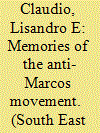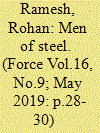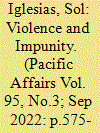| Srl | Item |
| 1 |
ID:
095137


|
|
|
|
|
| Publication |
2010.
|
| Summary/Abstract |
The Bantayog ng mga Bayani [Monument of Heroes] is a memorial centre in Manila dedicated to the memory of individuals who resisted the dictatorship of the late President Ferdinand E. Marcos. This article examines history as represented in this memorial centre. Through an examination of its museum and the debates concerning whom the Bantayog should honour as heroes, it analyses a key historical tension in the representation of the Marcos period: an ambivalence regarding the anti-dictatorship struggle of the organized Left. It also examines the class-based nature of historical memory in the Philippines, arguing that class positions inform who and what is remembered.
|
|
|
|
|
|
|
|
|
|
|
|
|
|
|
|
| 2 |
ID:
166169


|
|
|
| 3 |
ID:
187735


|
|
|
|
|
| Summary/Abstract |
As president from 2016 to 2022, Rodrigo Duterte captured the judiciary, dominated the legislature, attacked the media, and presided over a campaign of mass killing, leaving an estimated 30,000 alleged drug criminals dead. Despite wielding vast amounts of power, Duterte stepped down after the national elections on May 9, 2022 in a largely peaceful transfer of power to Ferdinand Marcos Jr., son and namesake of the former dictator deposed in 1986. Why did Duterte amass power without causing full democratic collapse into authoritarian rule? The Philippines experienced backsliding to competitive authoritarianism: while elections remain free and somewhat fair, other features of democracy like civil liberties and political freedoms have eroded badly because of mass violence. The Philippine case demonstrates the autocratizing effect of an emerging form of political violence: a focused campaign of state terror that produces fear and electoral success. I present evidence from two cases—the national “war on drugs” and its local antecedent in Davao City—to explain how violence escalates, provokes accountability, evades culpability, and contributes to democratic backsliding without immediate collapse to authoritarianism. With the election of Marcos Jr., the impunity of the former incumbent is likely to become institutionalized, and democratic backsliding is unlikely to be reversed.
|
|
|
|
|
|
|
|
|
|
|
|
|
|
|
|